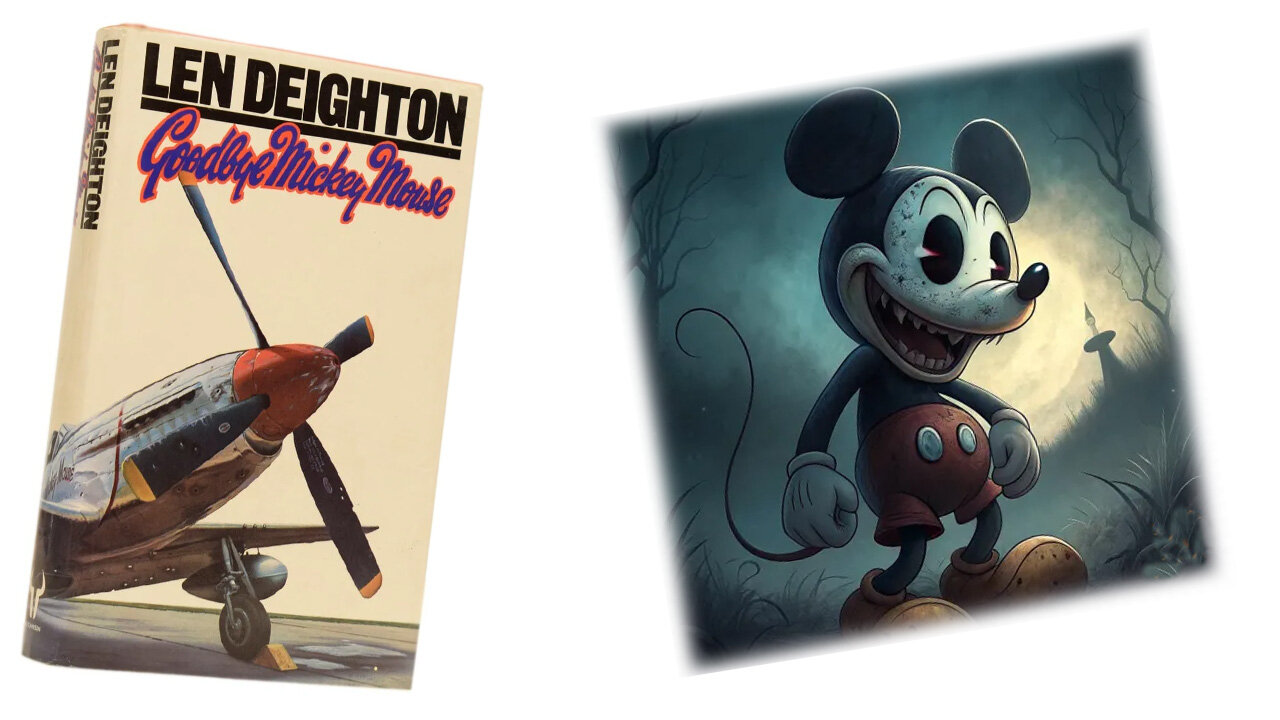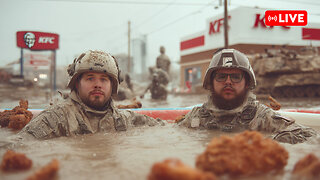Premium Only Content

'Goodbye, Mickey Mouse' (1982) by Len Deighton
'Goodbye Mickey Mouse' (1982) by Len Deighton is an elegant, melancholic, and surprisingly intimate novel that departs sharply from the cloak-and-dagger world of espionage for which the author is best known. Set in wartime England in 1944, the book follows a group of American fighter pilots stationed at an airbase in East Anglia as they prepare for dangerous missions deep into Nazi-held Europe. Rather than offering a high-octane war story, Deighton delivers a subtle, character-driven portrait of men caught between duty and fear, bravado and vulnerability, life and looming death. It is a novel about waiting, about coping, and about how human beings attempt to remain whole amid the machinery of war.
At its centre is Captain James Farebrother, a quiet, self-contained pilot who prefers to think rather than boast. A Harvard-educated historian, Farebrother brings a self-awareness and reserve uncommon among his peers, and it is through his perspective that much of the novel’s emotional weight is delivered. In contrast stands Captain Mickey Morse—nicknamed “Mickey Mouse” for his brashness and boyish charm—a hotshot ace obsessed with setting a new record for air kills. Morse is everything Farebrother is not: loud, reckless, insatiably hungry for glory. The relationship between these two men forms the novel’s core tension: admiration versus resentment, competition versus camaraderie, ideology versus impulse.
What distinguishes 'Goodbye Mickey Mouse' from many war novels is its slow, reflective pacing. This is not a story of non-stop aerial dogfights—though Deighton handles those moments with precision and narrative flair—but a meditation on the human condition in the shadow of annihilation. Much of the novel unfolds on the ground: in muddy airbases, makeshift bars, and quiet rooms. Deighton is concerned less with combat than with consciousness—how people carry fear, how they cope with boredom, and how war corrodes or clarifies who they really are.
There is also a love story threaded through the narrative, between Farebrother and Victoria Cooper, a British radio operator. Their relationship is written with restraint and subtlety, and it captures the strange intensity of wartime romance—urgent, tender, but always haunted by the knowledge that time is short and fate is arbitrary. Victoria is not just a romantic interest but a character with agency and intelligence. She offers a civilian counterpoint to the pilots’ lives, and through her, Deighton reflects on the different kinds of courage demanded by war.
Deighton’s prose in 'Goodbye Mickey Mouse' is unflashy, controlled, and deeply observant. He resists sentimentality without becoming cynical, and he manages to honour the experience of American airmen without mythologizing them. His eye for technical detail—always a hallmark of his writing—is present here as well, but it is folded seamlessly into the emotional and thematic fabric of the book. The descriptions of flight, the routines of maintenance, the banter among men who live with death as a daily possibility—all are rendered with authenticity and empathy.
In its structure and emotional tone, the novel bears some resemblance to A Farewell to Arms or The Thin Red Line. Like those works, 'Goodbye Mickey Mouse' is less interested in the outcome of war than in its effect on those who fight it. Deighton shows how identity, honour, and ambition are all reshaped in the cockpit, in the barracks, and in the quiet minutes before dawn. Even Mickey Morse, who might seem at first like a caricature of the American hero, is gradually shown to be a man carrying the weight of something he can’t quite name—fear, insecurity, or the desperate need to leave a mark.
The novel’s title is, in itself, poignant. “Mickey Mouse” is both the nickname of a pilot and a symbol of innocence and American optimism—something the war is systematically eroding. The farewell in the title is not only to a character but to a whole generation’s illusions. There is an elegiac quality to the entire book, a recognition that whatever happens in the skies over Germany, these men will not return the same. If they return at all.
'Goodbye Mickey Mouse' is not as well-known as Deighton’s spy novels, and it may surprise readers expecting the fast-paced, sardonic thrillers he made his name with. But in many ways, it is one of his most accomplished and emotionally resonant works. It demonstrates a breadth of talent often underappreciated in Deighton’s career: the ability to write not just about systems and secrets, but about people—their contradictions, their pain, their fleeting joys. Quietly devastating and beautifully crafted, 'Goodbye Mickey Mouse' is a war novel of unusual depth, one that lingers long after the final page.
-
 2:30:00
2:30:00
Badlands Media
13 hours agoDevolution Power Hour Ep. 392: Psyops, Paper Tigers, and the Path to Sovereignty
86.8K14 -
 3:02:08
3:02:08
TimcastIRL
7 hours agoLeftist Terror Attack On ICE In Dallas, Jimmy Kimmel Doubles Down Insulting MAGA | Timcast IRL
344K140 -
 1:17:35
1:17:35
Man in America
12 hours agoIs Starlink RIPPING Us Apart from the Inside Out? w/ Cory Hillis
47.5K15 -
 55:40
55:40
TheSaltyCracker
6 hours agoIdiots Chug Tylenol PT2 ReeEEStream 9-24-25
107K224 -
 5:55:01
5:55:01
Akademiks
7 hours agoYoung Thug Dissing YFN Lucci. Ready to Go back to Jail. Offset vs Cardi b
65.2K4 -
 7:07
7:07
Colion Noir
15 hours agoCalifornia Just Banned All Glocks
55.8K40 -

Adam Does Movies
8 hours ago $2.23 earnedTalking Movies + Ask Me Anything - LIVE
46K1 -
 1:23:56
1:23:56
Jamie Kennedy
6 hours agoChoosing Good in a World Gone Dark | Ep 223 HTBITY with Jamie Kennedy
38.3K6 -
 6:54:11
6:54:11
SpartakusLIVE
9 hours ago#1 Challenge CHAMPION of WZ || Ridin' The GRAVY Train w/ GloryJean
76.4K1 -
 1:53:10
1:53:10
The Pascal Show
5 hours ago $1.58 earnedDISTURBING UPDATES! New Developments In The D4vd Celeste Case... Possible Celeste Sighting?!
31.4K2